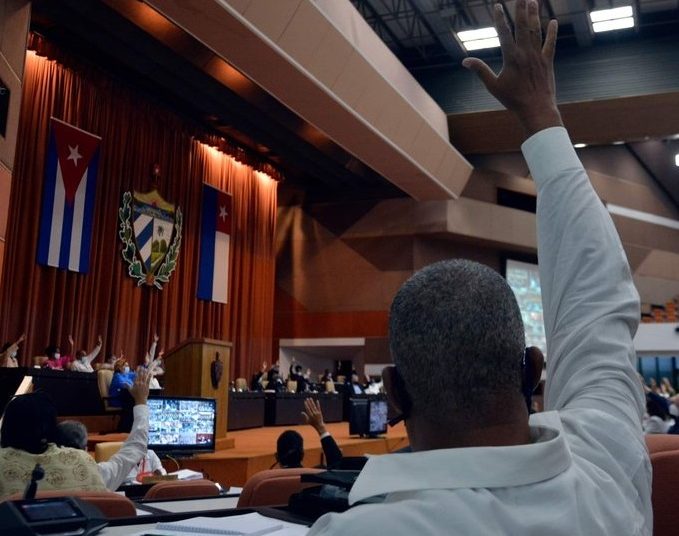The National Assembly of People’s Power (ANPP) approved four new laws this Wednesday during its first regular meeting of the year, held in person and virtually due to the coronavirus pandemic.
The four laws, which had been analyzed by the deputies in the previous sessions, “strengthen the institutional framework of the Cuban State” and “are part of the legislative schedule established by the new Constitution,” said the official Cubadebate site.
They are the laws on Foreign Service, on Organization and Functioning of the Council of Ministers, on Revocation of those Elected to the Organs of the People’s Power, and on the President and Vice President of the Republic.
Todos los órganos superiores del Estado (Asamblea Nacional del #PoderPopular, Consejo de Estado, Presidente y Vicepresidente de la República, Consejo de Ministros) cuentan ya con sus normas de desarrollo, un aporte al desarrollo de la nueva institucionalidad. #CubaLegisla pic.twitter.com/DQGgFpPpJl
— Asamblea Nacional Cuba (@AsambleaCuba) October 28, 2020
After the previous publication of their draft, for the final version of the laws, doubts and proposals for modifications made by legislators were taken into account, as well as “more than 100 proposals from citizens, who participated in the exercise via email and other enabled channels,” specified Prensa Latina (PL) news agency.
The Law on Foreign Service is “an eminently organic norm, through which all content related to the issue is hierarchized and organized in a single legal body,” the source said, according to which the Law on Organization of the Council of Ministers “will regulate what concerns the operation of the Government of the nation, for which it establishes work procedures and powers of that body, among other elements.”
For its part, the Law on Revocation of those Elected to the Organs of People’s Power “meets the need to update the current legislation on the matter and adjust it to the Magna Carta, which designs new structures and figures.” While that on the President and Vice President of the Republic “regulates the operation of both positions, develops the powers established by the constitution and provides for actions in case of replacement, among other aspects,” PL added.
Also on this day, corresponding to the Fifth Regular Period of Sessions of the 9th Legislature of the Assembly, Minister of Economy Alejandro Gil addressed the current economic situation of the island―which he described as “complex”―and the Cuban deputies ratified the agreements and decree laws approved by the Council of State between December 2019 and October 12 of this year.
In addition, 20 new legislators elected by the assemblies of the People’s Power of their municipalities were sworn in, including several of the new provincial governors, a position recovered in the new Constitution.
The session, which was broadcast live on state radio and television, was attended by President Miguel Díaz-Canel, who gave the closing speech, and former President Raúl Castro, leader of the Communist Party of Cuba (PCC) and deputy for Santiago de Cuba.
The plenary session had a semi-virtual format, since the deputies from other provinces participated electronically, while the 235 who reside in Havana, including the main leaders of the country, were present at the capital’s Convention Center, all wearing masks, according to the images released.
The Cuban parliament holds two regular plenary sessions a year and this week’s meeting corresponds to the first one, which should have been held in July, but was postponed due to the COVID-19 health crisis, an issue that was addressed on the previous day of this period, as well as the 2019 state budget.










